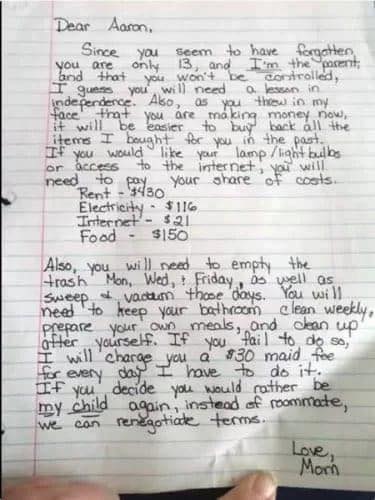Heidi Johnson from Temple, Arizona, devised a creative way to address her 13-year-old son Aaron’s defiance and lack of focus on schoolwork. After Aaron insisted that his income from YouTube excused him from fulfilling household responsibilities, Johnson took a firm stand. She left a detailed note on his bedroom door, laying out the financial realities of independent living. This “invoice” included pretend charges such as $116 for rent, $21 for internet, $150 for food, and a $30 cleaning fee for any chores left undone. Her approach was both a teaching moment and a wake-up call for Aaron about the privileges he enjoyed as part of the family.
The note began with a stern reminder of the roles within their household. “Hey Aaron, I see you forgot you’re just thirteen and I’m the parent here. Looks like you need a reminder about being independent,” Johnson wrote, emphasizing the consequences of Aaron’s behavior and the responsibilities that come with claiming independence. By framing her message in financial terms, Johnson aimed to show her son the value of the support he receives daily and the obligations tied to adulthood.
When Johnson’s approach became public, it sparked a range of reactions online. Many people applauded her tough-love method, seeing it as a valuable lesson in accountability. Supporters praised her for not only addressing Aaron’s disrespectful attitude but also for preparing him for the realities of life. They argued that such lessons are essential in teaching children to appreciate the effort and resources required to maintain a household. One commenter wrote, “This is exactly what kids need these days—a clear understanding that life isn’t free, and responsibilities come with privileges.”
On the other hand, some critics felt her method was overly harsh, questioning whether such measures were appropriate for a young teenager. They argued that Aaron might interpret the note as punitive rather than educational, potentially creating a rift in their relationship. Others suggested that there were gentler ways to teach children about responsibility without resorting to what they perceived as an extreme approach.
In response to the mixed opinions, Johnson defended her actions, explaining her intentions clearly. “I gave him a ‘bill’ to show a lesson. Nothing is free. Someone has to give up something eventually,” she stated. Johnson emphasized that her goal was not to alienate Aaron but to give him a practical understanding of how the world works. By illustrating the financial responsibilities of adulthood, she hoped to instill a sense of gratitude and a better work ethic in her son.
Johnson’s story has since ignited a broader conversation about parenting styles and the challenges of raising responsible, well-rounded children. Her approach highlights the ongoing debate over how to balance discipline and affection in parenting. While some parents prefer more lenient methods that foster open communication, others believe in setting firm boundaries to prepare children for the realities of life. Johnson’s experience serves as a reminder of the delicate balance required to achieve both.
Beyond the online debate, Johnson’s actions raise important questions about how we prepare children for adulthood. In an age where many teenagers have access to income streams like YouTube or other online ventures, it can be challenging for parents to teach the value of hard work and shared responsibilities. Johnson’s “invoice” underscores the need for children to recognize that financial independence involves more than earning money—it also requires contributing to the household and respecting family dynamics.
The incident also sheds light on the evolving role of parents in an increasingly digital world. With young people often exposed to opportunities and challenges that previous generations never faced, parenting strategies must adapt to teach life skills effectively. Johnson’s decision to frame her lesson in a way Aaron could relate to—through financial terms—was a creative solution to this modern parenting dilemma.
At its core, Johnson’s method reflects the dual role that parents play in their children’s lives. Parents must provide unconditional love and support while also setting boundaries and enforcing rules. Johnson’s note serves as a reminder that love and discipline go hand in hand. By addressing Aaron’s behavior firmly yet constructively, she reinforced the idea that her actions were motivated by care and a desire to see her son grow into a responsible adult.
This story has resonated with parents worldwide, sparking discussions about how best to teach children important life lessons. Whether one agrees with Johnson’s approach or not, her actions have highlighted the importance of fostering responsibility and independence in children. Parenting is never a one-size-fits-all endeavor, and Johnson’s story underscores the need for parents to tailor their strategies to their children’s personalities and circumstances.
In conclusion, Heidi Johnson’s unique solution to her son’s defiance serves as both a lesson in accountability and a broader reflection on the challenges of modern parenting. Her actions have inspired conversations about responsibility, independence, and the balance between love and discipline. While her method may not resonate with everyone, it undeniably achieved its purpose: reminding Aaron of the privileges he enjoys and the importance of contributing to the family. As parents navigate the complexities of raising children in today’s world, Johnson’s story offers valuable insights into the power of creative problem-solving and the enduring importance of teaching life skills.
